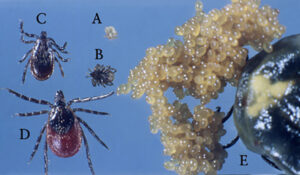Call for your appointment today 914-666-4665 | Mt. Kisco, New York

by Daniel J. Cameron, MD MPH
1. Growing list of eye problems in Lyme disease

2. Study raises concerns for Babesia patients and blood banks
Babesiosis, an emerging tick-borne disease caused by the parasite Babesia microti, is currently the highest ranked pathogen transmitted by blood transfusions.
3. Lyme meningitis, manifesting as Parkinsonism, is fully reversed with ceftriaxone

4. Should Lyme disease be added to the causes of vocal cord paralysis?
Lyme disease is one of several causes of vocal cord paralysis, a condition that can dramatically impact patients’ lives, affecting voice, swallowing and airway function.
5. Women with chronic Lyme disease may suffer from a severe immune response triggered by the disease
Women with chronic manifestations of Lyme disease are often told they suffer from a variety of other illnesses including depression, rheumatoid arthritis, fibromyalgia and chronic fatigue syndrome or unexplained medical symptoms.
6. W
Two leading research groups describe the dangers in taking the watch and wait approach to Lyme disease.
Studies examining impaired or heightened sense of smell have been focused primarily on patients suffering from neurological disorders. And while there have been many anecdotal reports from Lyme disease patients complaining about their sensitivity to smells, there has never been a study examining the association between Lyme disease and hyperosmia — until now.
8. Tick-borne co-infections are the norm, not the exception
Over the past two decades, the number of disease-causing agents carried by ticks and the severity of illness that can result has led to calls for more aggressive tick bite prevention efforts and research of co-infections.
9. What might sudden cardiac death due to Lyme disease look like?
“Although rare, sudden cardiac death caused by Lyme disease might be an under-recognized entity,” according to researchers who describe their findings from an autopsy study on 5 case patients who died from sudden cardiac death and were found post mortem to have Lyme carditis.
10. Level with Lyme disease patients, at least 1 in 3 can fail treatment
Lyme disease patients are frequently reassured that the standard 21- to 30-day course of antibiotics will effectively treat the infection. This gives patients a false sense of security about a disease that is leaving thousands of individuals chronically ill.

In the Netherlands, a significant number of patients with Lyme borreliosis do not recall being bitten by a tick. It is estimated that 1.1 million people in the Netherlands are bitten by one or more ticks annually and that larvae are responsible for 1.3% to 4.2% of those tick bites.
12. Different response by CDC to spread of Zika virus vs. Lyme disease-carrying ticks
Although Lyme disease and the Zika virus are transmitted by different types of vectors, both illnesses can cause severe, long-term health damage and are of enormous concern to the general public. The response by the Centers for Disease Control and Prevention (CDC) to each threat, however, has been decidedly different.

A case report by Almoussa and colleagues demonstrates that the infectious agent Borrelia burgdorferi can trigger cognitive impairments. The authors describe a 43-year-old patient from Germany who suffered a stroke due to Lyme disease and continued to have cognitive issues despite treatment.
14. Limits on antibiotics for Lyme disease leave doctors in limbo
Physicians have long been advised to stick to a fixed treatment duration when prescribing antibiotics for Lyme disease. But a growing number of clinicians are finding that patients remain sick or experience a new onset of symptoms once treatment ends.

Lyme disease is typically referred to as an endemic problem. Is it time to designate it as a pandemic? The disease clearly meets the criteria.




